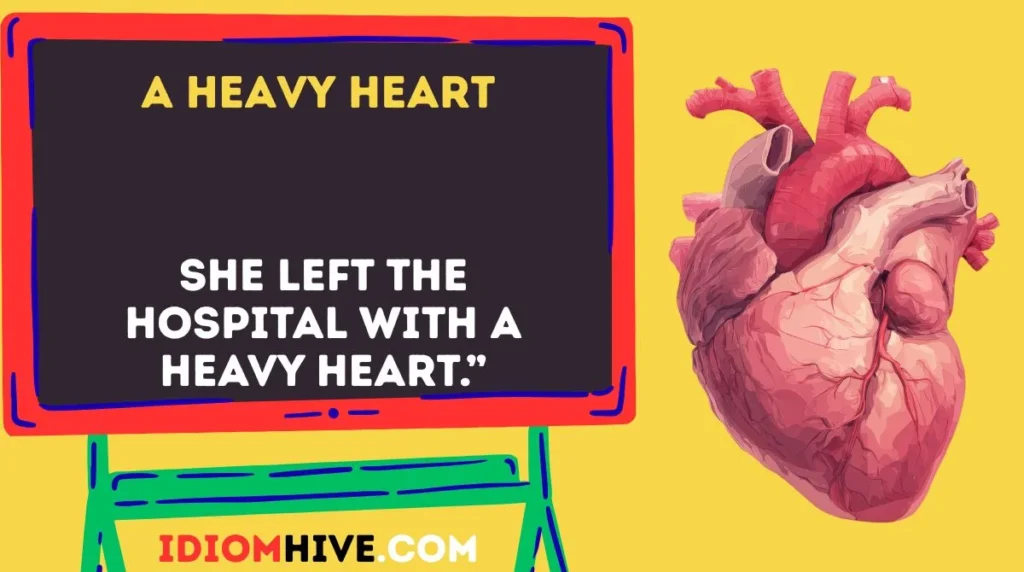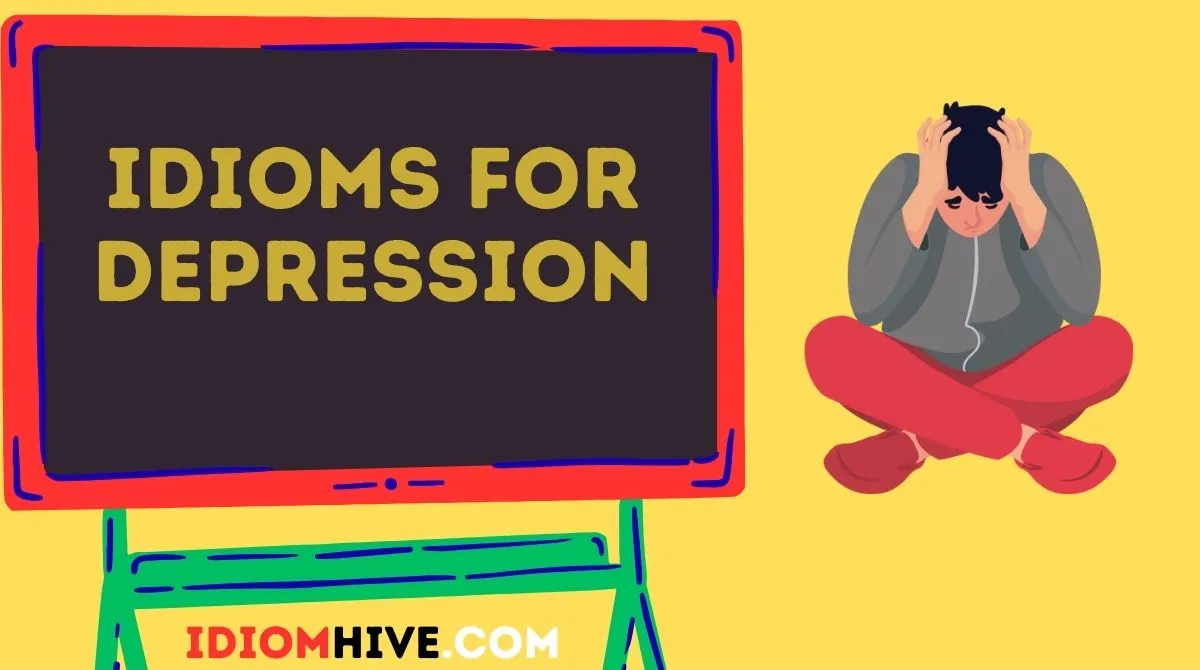Depression is a heavy topic, but language often finds creative ways to capture even the most difficult emotions. Idioms, in particular, allow us to express feelings in indirect yet powerful ways.
An idiom is a phrase whose meaning cannot be understood from the literal words alone. For example, saying someone is “feeling blue” does not mean their skin has turned blue—it means they are sad.
When it comes to describing sadness, gloom, or depression, idioms are extremely useful in English. They help us capture emotions in colorful, relatable, and memorable ways.
For learners, knowing idioms for depression adds richness to conversations, helps in understanding literature or movies, and makes everyday communication more natural. Instead of saying
“I am very sad,” you could say “I’m down in the dumps”—and immediately, your English sounds more fluent and expressive.
Did You Know?
Many idioms about sadness and depression come from old cultural references. For example, the phrase “crying over spilled milk” goes back to the 1600s, when milk was considered a valuable household item. Similarly, “down in the dumps” comes from 16th-century English plays, where “the dumps” referred to a gloomy mood. These old expressions live on today, giving English its poetic charm.
Idioms About Feeling Sad or Low
Feeling Blue
Meaning: To feel sad or down.
Example: “She’s been feeling blue since her best friend moved away.”
Alternative: Down in the dumps.
Note: Very common and informal, used in everyday speech.
Down in the Dumps
Meaning: To be in a gloomy or depressed state.
Example: “After failing the exam, he was really down in the dumps.”
Alternative: Feeling low.
Note: Often used casually when someone feels hopeless or disappointed.
In the Depths of Despair
Meaning: To feel extreme sadness or hopelessness.
Example: “She was in the depths of despair after losing her job.”
Alternative: At rock bottom.
Note: Slightly formal, often used in writing or dramatic contexts.
At Rock Bottom
Meaning: To reach the lowest point emotionally or mentally.
Example: “After his divorce, he felt like he had hit rock bottom.”
Alternative: In the pits.
Note: Common in both casual and professional discussions about mental health.
A Heavy Heart

Meaning: To feel deep sorrow or grief.
Example: “She left the hospital with a heavy heart.”
Alternative: Sad at heart.
Note: Poetic, often used in writing, literature, or formal speech.
In Low Spirits
Meaning: Feeling depressed or lacking energy.
Example: “He’s been in low spirits since moving to a new city.”
Alternative: Feeling blue.
Note: Slightly formal, often used in polite conversations.
The Black Dog
Meaning: A metaphor for depression, famously used by Winston Churchill.
Example: “He said the black dog was following him again.”
Alternative: Feeling weighed down.
Note: More literary and less common in everyday speech.
In a Funk
Meaning: To feel low, moody, or depressed.
Example: “She’s been in a funk all week after the breakup.”
Alternative: In the dumps.
Note: Informal, common in American English.
In the Pits
Meaning: To feel extremely bad or hopeless.
Example: “I was really in the pits after failing my driving test.”
Alternative: Rock bottom.
Note: Casual, used in friendly conversation.
Idioms About Hopelessness and Struggles
Crying Over Spilled Milk
Meaning: To be upset about something that cannot be changed.
Example: “Yes, you lost the game, but there’s no use crying over spilled milk.”
Alternative: What’s done is done.
Note: Common in advice-giving, informal contexts.
Lost in the Shadows
Meaning: To feel forgotten or hidden in sadness.
Example: “After her illness, she felt lost in the shadows.”
Alternative: Left in the dark.
Note: More poetic, often found in literature.
Carrying the Weight of the World
Meaning: To feel overwhelmed by problems.
Example: “He always looks like he’s carrying the weight of the world on his shoulders.”
Alternative: Heavy burden.
Note: Commonly used to describe stress and depression together.
A Dark Cloud Overhead
Meaning: A sense of constant sadness or worry.
Example: “Ever since the accident, there’s been a dark cloud over her.”
Alternative: Gloom hanging over.
Note: Informal but vivid; used in storytelling or personal expression.
Down but Not Out
Meaning: Feeling defeated but still holding on.
Example: “He’s down but not out after losing his job.”
Alternative: Hanging in there.
Note: Motivational, used in informal and professional talk.
Broken-Hearted
Meaning: Deep sadness due to loss, usually romantic.
Example: “She was broken-hearted after the relationship ended.”
Alternative: Heartbroken.
Note: Very common in everyday English.
A Sad State of Affairs
Meaning: A depressing or unfortunate situation.
Example: “It’s a sad state of affairs when people can’t afford food.”
Alternative: A sorry situation.
Note: More formal, often used in serious discussions.
To Lose Heart
Meaning: To feel discouraged or hopeless.
Example: “He began to lose heart after several failed attempts.”
Alternative: To give up hope.
Note: Can be formal or informal depending on context.
Idioms About Emotional Pain
Tears Rolling Down
Meaning: To cry due to sadness.
Example: “She had tears rolling down her face after the news.”
Alternative: To burst into tears.
Note: Used in everyday conversation.
Heart in Pieces
Meaning: To feel emotionally shattered.
Example: “His heart was in pieces when she left.”
Alternative: Broken-hearted.
Note: Poetic and common in emotional writing.
To Feel Crushed
Meaning: To feel extremely sad or disappointed.
Example: “He was crushed when he didn’t get the scholarship.”
Alternative: Devastated.
Note: Very common in speech and writing.
A Lump in One’s Throat
Meaning: A feeling of sadness that makes speaking difficult.
Example: “He had a lump in his throat during the farewell speech.”
Alternative: Choked up.
Note: Often used in emotional or sentimental contexts.
Cry One’s Eyes Out
Meaning: To cry heavily.
Example: “She cried her eyes out after the funeral.”
Alternative: Sob uncontrollably.
Note: Informal, used in everyday conversation.
A Hollow Feeling
Meaning: A deep emptiness caused by sadness.
Example: “He had a hollow feeling after losing the competition.”
Alternative: Empty inside.
Note: Poetic and descriptive.
Shattered Dreams
Meaning: When hopes are destroyed, causing sadness.
Example: “Her shattered dreams left her feeling hopeless.”
Alternative: Broken hopes.
Note: Common in writing and motivational talks.
Idioms About Struggling with Life
Burned Out
Meaning: Feeling exhausted and depressed from stress or overwork.
Example: “He’s completely burned out from working too many hours.”
Alternative: Worn out.
Note: Common in workplaces.
Drowning in Sorrows
Meaning: Trying to forget sadness, often with distractions.
Example: “He was drowning in sorrows at the bar.”
Alternative: Drinking away troubles.
Note: Informal, used in everyday contexts.
At the End of the Rope
Meaning: To feel like you can’t handle more problems.
Example: “I’m at the end of my rope with all this stress.”
Alternative: Fed up.
Note: Common in informal speech.
In Over One’s Head
Meaning: Struggling with something too difficult to handle.
Example: “She realized she was in over her head with the project.”
Alternative: Out of depth.
Note: Everyday expression, often workplace-related.
Worn to a Frazzle
Meaning: Exhausted physically and emotionally.
Example: “She was worn to a frazzle after caring for her sick child.”
Alternative: Burned out.
Note: Informal, often spoken.
World Weary

Meaning: Tired of life’s struggles.
Example: “He had a world-weary look in his eyes.”
Alternative: Jaded.
Note: Slightly formal, used in writing or literature.
Throwing in the Towel
Meaning: To give up due to exhaustion or hopelessness.
Example: “He finally threw in the towel after months of trying.”
Alternative: Giving up.
Note: Informal but very common.
How to Use These Idioms in Daily Life
Idioms for depression can be used in different ways depending on the situation:
- Speaking: Use casual idioms like feeling blue or down in the dumps when talking to friends.
- Writing: In emails, articles, or stories, more formal idioms like in low spirits or a heavy heart fit better.
- Professional Settings: Workplace idioms like burned out or at the end of my rope are common to describe stress without sounding too dramatic.
Common Mistakes Learners Make With Idioms
- Wrong usage:
❌ “I am blue today because I wore a sad shirt.”
✅ “I am feeling blue today because I’m missing my family.” - Literal translation mistake:
❌ “He cried over the milk he spilled.”
✅ “He was crying over spilled milk.” - Mixing idioms incorrectly:
❌ “She was down in the blue dumps.”
✅ “She was down in the dumps.”
FAQs
1. Are idioms for depression always negative?
Not always. Some, like down but not out, carry a hopeful message.
2. Can I use these idioms in formal writing?
Some idioms like in low spirits or a heavy heart work in formal writing, but casual idioms like cry one’s eyes out are best for informal speech.
3. Do native speakers use these idioms often?
Yes, many of them are very common in daily speech, movies, and books.
4. Are idioms about depression only used when someone is clinically depressed?
No, they are often used for everyday sadness, disappointment, or emotional struggles—not just medical depression.
5. What’s the easiest idiom about sadness for beginners?
Feeling blue is short, simple, and very commonly used, making it perfect for learners.
Conclusion
Depression and sadness are hard to talk about, but idioms make it easier to express such feelings in a vivid and natural way.
Whether you’re saying you’re feeling blue, carrying the weight of the world, or at the end of your rope, idioms allow you to share emotions in a way that feels human and relatable.
By learning these expressions, you can speak English with more confidence, connect with people better, and even appreciate literature and movies on a deeper level.
So the next time you feel down, remember: words have the power to carry your feelings, and idioms are one of the best tools to do that.










